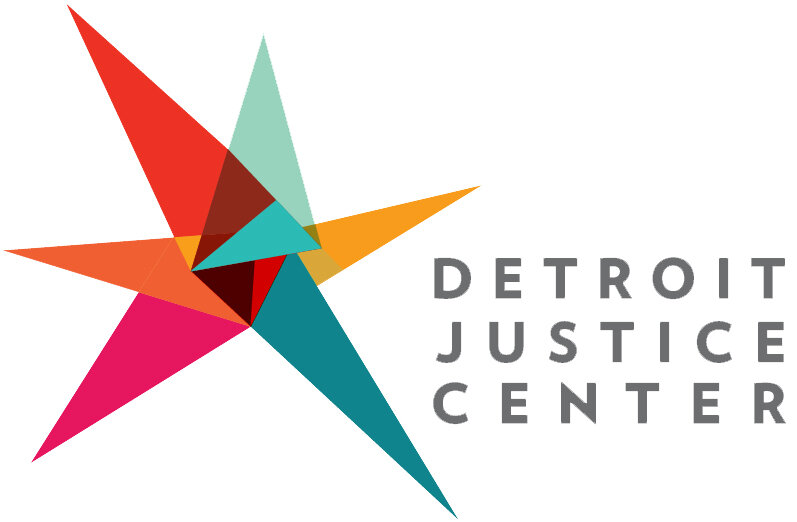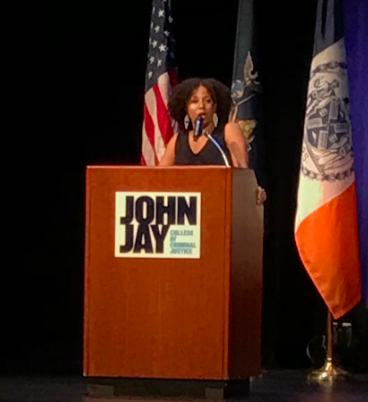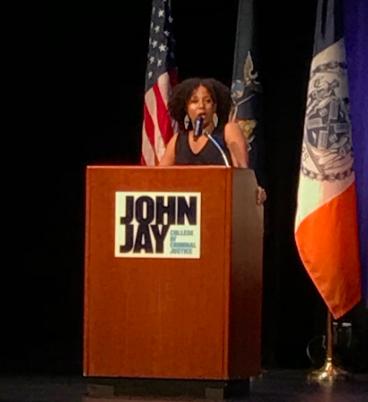Centering our freedom dreams: The fight ahead for just communities
(The following speech was given by DJC’s Amanda Alexander to attendees of the Smart On Crime Conference at John Jay College in NYC on September 24, 2019)
Good morning. I hope that when I’m done speaking in ten minutes, you’ll feel a greater sense of possibility. I hope you’ll feel how high the stakes are in this fight against mass incarceration—because it’s really a fight for the future of our communities and for our capacity to care for each other as human beings. And I hope you’ll feel your mind firing—because it’s time for all of us to be brave enough to use our full imaginations.
First, let me ground us in place. Let me show you the view from Detroit. I moved home to Michigan six years ago to serve families like mine that had been divided by the prison system. Detroit was about to file the largest ever municipal bankruptcy, and people couldn’t seem to decide whether we were 50 years ahead or 50 years behind the rest of the country. It’s clear to me that we’re 50 years ahead—we don’t hold any illusions about American capitalism. My neighbors have told me stories about the good old days–about getting fired from Ford and being able to walk across the street and get an even better job at GM. Now they also tell me stories about decades of unemployment, losing their homes to foreclosure, and getting swept up in the criminal legal system.
Detroit is especially fertile ground for imagining a future beyond jails and prisons. Over the past six years Detroiters have shown me every day what it means to be a solutionary—to create visionary solutions in the face of devastation. When grocery stores leave, Detroiters teach each other how to farm and they share seeds. When politicians and developers try to build a new jail, many Detroiters say stop—let’s build places where we can heal instead. When the city shuts off people’s water because they’re too poor to pay—as it has done to more than 112,000 homes since 2014—Detroiters link arms with our people in Flint, and fight together to make sure we’ll ALL have access to clean, affordable water as a human right in the decades to come.
What does all of this have to do with crime, criminalization, and punishment? I founded the Detroit Justice Center on the belief that we cannot build cities that work for everyone without remedying the impacts of mass incarceration. And our work is rooted in an understanding that ending mass incarceration is both an essential end in itself and a necessary means to creating thriving communities.
What does this work look like in practice? At the Detroit Justice Center we use a three-pronged strategy we call “Defense, Offense, and Dreaming.” Because we need all three under one roof. Our legal services practice goes on Defense for our clients, removing legal barriers that keep people shut out of the economy. Our clients come to us with 14 traffic-related warrants across 6 different counties, or $70,000 in child support debt that amassed while they were in prison, or thousands of dollars in fines and fees because they’ve been driving on a suspended license, and impending jail time. They come to us squeezed to the brink by a system that’s so adept at destroying poor people’s lives. We resolve those legal barriers. And our clients get jobs. And stay with their families. And remain out of prison. And then we go on OFFENSE with our Economic Equity practice. Our attorneys provide legal support for transformative economic solutions like community land trusts, worker cooperatives, and enterprises led by returning citizens.
And our Just Cities Lab is where we dream, and more importantly, support and inspire our clients to dream—and where we turn those dreams into pilot programs. Right now, we are working on creating supportive housing for our clients who are healing from gun violence and would otherwise have nowhere to go once they’re discharged from the hospital. We’re creating a model for the types of things communities can build that will actually interrupt cycles of violence, trauma, re-injury, incarceration, and more violence.
At the Detroit Justice Center, we say that we hold our clients’ freedom dreams as sacred. What do I mean by that? One of our clients is a community organization that quietly bought up 14 homes around their community center. They came to us because they wanted to figure out some sort of legal entity to keep the houses and the neighborhood affordable for generations—perhaps a community land trust. They said they wanted to turn one of the homes into transitional housing for men coming back from prison. And they want to outfit the whole neighborhood with community solar, and create a small business corridor. That’s a freedom dream. That is the future, that’s resilience. They’re combining solutions for neighborhood affordability, re-entry housing, and climate justice. It’s our job as movement lawyers to help them translate it into reality.
And here’s the best part—yes, Detroiters have become especially visionary—out of necessity—but you have freedom dreamers and solutionaries in your cities and towns. Some of you are those people. For the rest of you, find them. Take your cues from them. Support them.
At the Detroit Justice Center we recognize that it’s not enough to talk about ending mass incarceration. We will tear down jails and prisons, but beyond that—what will we build in place of them to restore our communities? How do we remake the relationship between urban and rural areas so we are linked for our mutual benefit, rather than through the circuitry of incarceration? And how do we get from here to there?
In Detroit, we are fighting a new jail and a new youth jail that the County plans to build. As part of that fight, the Detroit Justice Center has held design workshops with young people in to design alternatives to the jail. Last fall we asked teens, “How could we spend half a billion dollars in your community to make you feel safe, valued, and empowered?” And not one of them said more jails or more police. Instead, they said:
-
Let’s build a mental health spa. A place where people could go and talk through what’s weighing them down and resolve conflicts. There’d be individual therapy and group therapy. They had it planned down to what paint colors would be most soothing for the walls.
-
One boy said, “If I had that money, I’d give it away to my neighbors. Because I’d know that if they felt OK and safe, I would be safe, too.”
-
One girl said, “I wish there were a building where you could go and if you really needed money, like really needed it, you could get what you needed, without filling out a lot of paperwork.”
-
They said “pay our teachers.” “Fix the lead pipes in our schools.” They said “create affordable housing—and make it accessible for my grandma’s wheelchair.” They said “Build regional transit.” “Build Restorative justice centers.”
-
These are Freedom Dreams. And they are especially sacred because young people inherit the world we create. And they are reverberating—we’ve heard from people from DC to Seattle who say, “look at Detroit’s young people, showing us the world beyond jails.”
While our work is deeply local, driven by the concerns and visions of Detroiters, our mission is global. We—all of us– can interrupt cycles of violence and decide that the era of building jails is over, enabling us to re-direct the abundance of our resources and energy toward supporting people from Detroit to New Orleans and to Johannesburg to create their own blueprints for a just city.
Our mission is to build and share this innovative Detroit model in order to inspire people around the world to create just communities. Just communities are ones where people have everything they need to care for each other. Rather than looking at our communities as oceans of need, we choose to respect, treasure, and harness the imagination and assets in our cities.
In addition to the work we are doing on the ground in Detroit we also speak and write about creating just cities. That includes our own efforts and the efforts of thousands of other people all over the world. We are now working to launch a podcast of live events interviewing prominent visionaries and solutionaries to ask the critical questions that need to be explored and to inspire people about what is possible.
As global as our vision is, we never lose our focus on the individual human beings in Detroit we work with, believe in, and care about. People who have lived for far too long with being criminalized, policed, stopped, picked up, and jailed.
Now so much more is possible.
The worst thing we could do—over the next two days of this conference and in the years to come—would be to not dream big enough or demand big enough. My mentor and friend Vince Warren of the Center for Constitutional Rights likes to ask, “5 generations from now, what will Black people thank us for?” It’s a beautiful question. It helps us focus on our purpose and on doing work that will last.
Someone had dreams for us—thank god. I’m thankful for the people five generations ago who were obsessed with getting free and refused to settle for less. Today Detroiters and people in communities across the country, especially young people, are using their full imaginations. To be clear, we do not have all the answers. But we’re asking better questions. It is the honor of a lifetime to work alongside people … communities … that are asking very high stakes questions, like “How can we be healthy people so that we can create healthy communities?” “How, through our heartbreak, can we be more open-hearted people, so that we can create cities and towns that are more just.” We invite you to be part of this transformative work—work that, if we’re lucky, future generations just might thank us for. Work that is already happening, and that nothing can stop.


